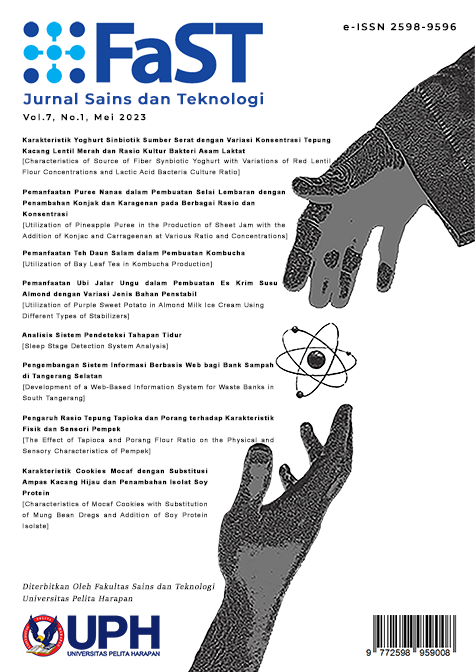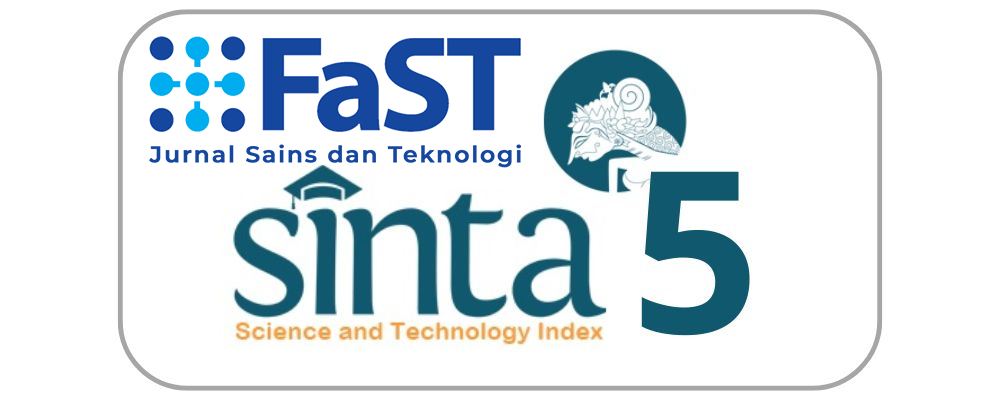PENGEMBANGAN SISTEM INFORMASI BERBASIS WEB BAGI BANK SAMPAH DI TANGERANG SELATAN [DEVELOPMENT OF A WEB-BASED INFORMATION SYSTEM FOR WASTE BANKS IN SOUTH TANGERANG]
DOI:
https://doi.org/10.19166/jstfast.v7i1.6711Keywords:
IS Success Model, SDLC Prototype, waste bank, web based information systemAbstract
To support the government's program in achieving a zero waste target, the information system used by waste collectors, waste bank managers, or individuals needs to be developed. The academic community has supported the government program by designing an information system. However, the system requires sustainable maintenance and development to meet user needs. SampahQu is a mobile application used for depositing Tetra Pak packaging waste in South Tangerang. However, the application cannot be used due to lack of maintenance. The purpose of this research is to develop an information system based on the framework of the previous application, but expanded to deposit 48 other types of waste. The development method used is the System Development Life Cycle (SDLC) Prototype, which consists of planning, analysis, design, implementation, and testing stages. In the planning stage, the business process, user needs, and system development feasibility analysis are obtained. The results of the analysis stage consist of use case diagrams, activity diagrams, class diagrams, and normalized relational tables. The application will be used by waste collectors, waste bank managers, and personal customers, so login is required for access suitability: registration, waste bank data update, transaction input, viewing historical data, and reporting. The results of the design and implementation stage were successfully tested with users using the Delone and McLean success measurement method, with a score of 4.8 out of 5.
Bahasa Indonesai Abstract:
Untuk mendukung program pemerintah mencapai target bersih sampah, diperlukan pengembangan sistem informasi yang dapat digunakan oleh pengepul, pengurus bank sampah atau personal. Pihak akademisi telah mendukung program pemerintah melalui perancangan sistem informasi. Namun diperlukan adanya pemeliharaan dan pengembangan yang berkelanjutan dari sistem tersebut agar dapat memenuhi kebutuhan pengguna. Aplikasi SampahQu merupakan aplikasi mobile yang digunakan untuk menyetor sampah kemasan Tetra Pak di Tangerang Selatan. Namun karena belum ada pemeliharan, aplikasi tersebut tidak dapat digunakan lagi. Tujuan penelitian ini adalah mengembangkan sistem informasi berdasarkan kerangka kerja aplikasi sebelumnya, namun diperluas untuk penyetoran 48 jenis sampah lainnya. Metode pengembangan yang digunakan adalah metode Daur Hidup Pengembangan Sistem atau System Development Life Cycle (SDLC) Prototype, yang terdiri dari tahap perencanaan, analisis, pembuatan, implementasi dan testing. Pada tahap perencanaan diperoleh proses bisnis, kebutuhan pengguna dan analisis kelayakan pengembangan sistem. Hasil dari tahap analisis terdiri dari use case diagram, activity diagram, class diagram dan tabel relational ternormalisasi. Aplikasi akan digunakan oleh pengepul, pengurus bank sampah dan nasabah personal maka login diperlukan untuk kesesuaian akses: register, update data bank sampah, input transaksi, melihat data histori, dan pelaporan. Hasil dari tahap pembuatan dan implementasi berhasil diujicoba kepada pengguna dengan menggunakan metode pengukuran keberhasilan dari Delone dan McLean sebesar 4.8 dari skala 5.
References
Connolly, T., & Begg, C. E. (2015). Database systems: A practical approach to design, implementation (6th ed.). Pearson.
Delone, W. H., & Mclean, E. R. (2003). The DeLone and McLean Model of Information Systems Success: A Ten-Year Update. Journal of Management Information Systems, 19(4), 9-30. https://doi.org/10.1080/07421222.2003.11045748
Dennis, A., Wixom, B. H., & Tegarden, D. (2015). Systems Analysis and Design: An Object-Oriented Approach with UML (5th ed.). Wiley.
Hery. (2019). Pembuatan dan penyerahan aplikasi “SampahQu” sebagai bagian dari projek pengumpulan sampah kemasan tetra pak di Tangerang Selatan. Universitas Pelita Harapan.
KLHK. (2018). Siaran Pres Pejabat Pengelola Informasi dan Dokumentasi. Retrieved February 20, 2023 from http://ppid.menlhk.go.id/berita/siaran-pers/4229/klhk-dampingi-pemerintah-daerah-tuntaskan-amanat-presiden-agar-indonesia-bersih-sampah-2025
KLHK. (2022) Sistem Informasi Manajemen Sampah (SIMBA). Retrieved March 20, 2023 from https://simba.menlhk.go.id/portal/
Mustaqbal, M. S., Firdaus, R. F., & Rahmadi, H. (2015). Pengujian plikasi Menggunakan Black Box Testing Boundary Value Analysis (Studi Kasus : Aplikasi Prediksi Kelulusan SNMPTN). Jurnal Ilmiah Teknologi Informasi Terapan, 1(3), 31-36.
Setyawati, E., Sarwani, H., Wijoyo, H., & Soeharmoko, N. (2020). Relational Database Management System (RDBMS). CV Pena Persada.
Sharma, I. (2021). Define Feasibility Study In Software Engineering. Retrieved Desember 17, 2022 from https://www.tatvasoft.com/outsourcing/2022/08/define-feasibility-study-in-software-engineering.html
SISPN (2021). Komposisi Sampah. Retrieved December 16, 2022 from https://sipsn.menlhk.go.id/sipsn/public/data/komposisi
Suryani, A. S. (2014). Peran Bank Sampah Dalam Efektivitas Pengelolaan Sampah. Jurnal Masalah-Masalah Sosial, 5(1), 71-84.
Yuliana, K., Saryani, & Azizah, N. (2019). Perancangan Rekapitulasi Pengiriman Barang Berbasis Web. Jurnal Sisfotek Global, 9(1), 118-123.Downloads
Published
Issue
Section
License
“Authors who publish with this journal agree to the following terms:
1) Authors retain copyright and grant the journal right of first publication with the work simultaneously licensed under a Creative Commons Attribution License (CC-BY-SA 4.0) that allows others to share the work with an acknowledgement of the work's authorship and initial publication in this journal.
2) Authors are able to enter into separate, additional contractual arrangements for the non-exclusive distribution of the journal's published version of the work (e.g., post it to an institutional repository or publish it in a book), with an acknowledgement of its initial publication in this journal.
3) Authors are permitted and encouraged to post their work online (e.g., in institutional repositories or on their website). The final published PDF should be used and bibliographic details that credit the publication in this journal should be included.”





